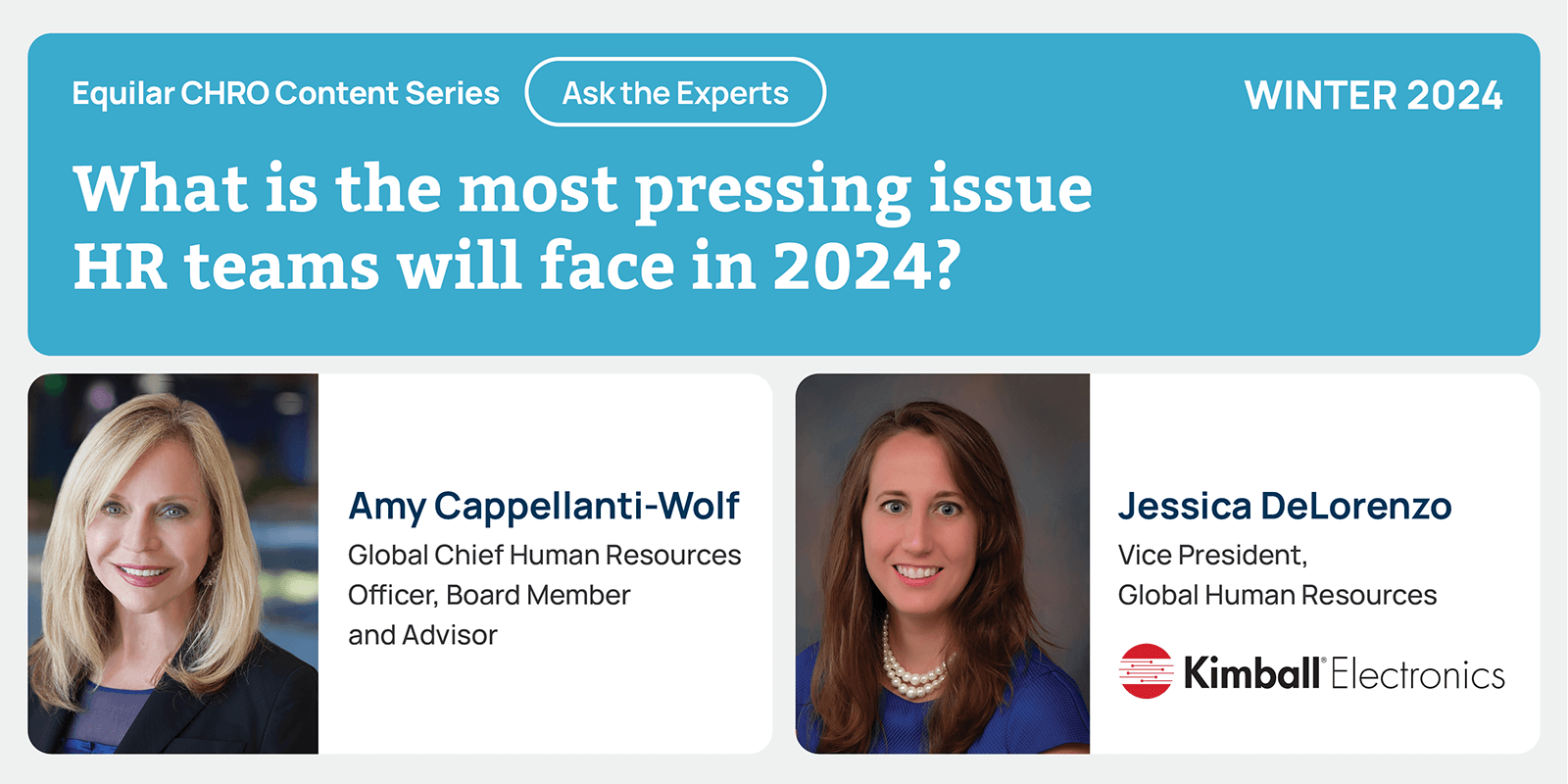CHRO Content Series: Ask the Experts
What is the most pressing issue HR teams will face in 2024?
February 22, 2024

The Equilar CHRO Content Series offers insights and trends related to top HR officers among public companies across the U.S. For this installment, Equilar sat down with experts in the HR field for their thoughts on the most pressing issues HR teams will face in 2024.

Amy Cappellanti-Wolf
Global Chief Human Resources Officer, Board Member and Advisor
Amy Cappellanti-Wolf is a Global Chief Human Resources Officer, Talent & Business Transformation Advisor, Public Speaker, Mentor and Coach. Amy is an accomplished senior human resource professional, business transformer and executive coach with expertise in working with startups to Fortune 500 enterprises. Her capabilities focus on developing high performance leadership teams and guiding organizations through complex and challenging business transformations, including pre-IPO, rapid growth, mergers, acquisitions, divestitures, and culture changes.
In 2024, HR teams will grapple with the evolving landscape of remote work and its impact on employee engagement, well-being and organizational culture. The accelerated adoption of remote and hybrid work models has reshaped the way companies operate, creating both opportunities and challenges.
The foremost concern for HR professionals will be maintaining a sense of connection and belonging among remote and on-site employees. The physical distance inherent in remote work can lead to feelings of isolation and disengagement. HR teams must proactively implement strategies to foster a cohesive company culture, utilizing digital platforms for establishing goal alignment, team-building activities, virtual events and regular check-ins.
The role of managers has become increasingly challenging in recent years, with the need to adapt to various fronts. This includes navigating the complexities of hybrid workplaces, ensuring effective performance management and goal alignment, and addressing the mental and physical well-being of employees. Enabling managers and enhancing their skills to meet these evolving demands should be on every organization's top priorities.
Another critical aspect is the well-being of employees in the remote work environment. The boundary between work and personal life has become increasingly blurred, leading to potential burnout and stress. HR professionals will need to prioritize mental health initiatives, promote work-life balance and ensure that employees have the necessary resources to manage their workload effectively.
Equity and inclusivity will also be at the forefront of HR priorities in 2024. As remote work continues, HR teams must address the disparities that may arise between on-site and remote workers. Fair distribution of opportunities, transparent communication and inclusive decision-making processes will be essential in creating an equitable work environment.
Additionally, HR will need to adapt talent acquisition and retention strategies to attract and retain top talent in the competitive landscape shaped by remote work. Emphasizing flexible work arrangements, career development opportunities, and a supportive company culture will be pivotal in securing and retaining skilled professionals.
In conclusion, HR teams in 2024 must navigate the complexities of a dispersed workforce, focusing on building a connected and inclusive culture, prioritizing employee well-being, and adapting recruitment and retention strategies to align with the changing dynamics of remote and hybrid work. By addressing these challenges proactively, HR professionals can contribute to the sustained success and resilience of their organizations in the years to come.

Jessica DeLorenzo
Vice President, Global Human Resources

Jessica DeLorenzo, SHRM-CP, increases the quality of others’ lives as the Vice President of Human Resources at Kimball Electronics (NASDAQ: KE). She leads the people strategy for the company focusing on succession planning, leadership development, culture, and DEI&Belonging while supporting the Talent, Culture and Compensation Committee of the Board of Directors.
With many industries and economies seeing softening demand in 2024, companies will be challenged to make some very difficult decisions, especially as it relates to their people. These decisions will likely stress company cultures. We have already seen some of the fallout that occurs when these hard decisions go wrong. Yet, in these difficult times, companies that protect the good things about their culture will continue to come out ahead in the market. Protecting the good of a company culture often means reminding employees of the difference between culture and climate within the bounds of that organization.
If a company’s culture is people-centered and purpose-driven, then that company must help employees not confuse culture with climate when hard decisions are made. Consider culture as the values, beliefs and underlying motivations of an organization. Climate as the processes, procedures and tools that exist in an organization or how it does business. Because change is hard, often, the increasing pace of change causes workers to label decisions or changes as culture when they are in fact climate. This can be especially true when decisions are difficult or undesirable, resulting in cynicism or distrust. A change in a policy may feel like a change in culture when in fact it is a change in climate. When things are hard, it can be easy for an already anxious workforce to catastrophize even the smallest policy revision. The underlying values of a policy revision may be congruent with all the good within a company culture, so organizations must remind employees of the why that lead to the how. Company climates should change to respond to internal and external dynamics. A people-centered and purpose-driven culture provides the foundation that helps the workforce feel safe among the increasing pace of change. That is, if they understand the difference between culture and climate. Protecting the good in a people-centered and purpose-driven culture will continue to challenge human resources teams this year and in the future, but it is the noblest cause. It is the most important work.
 Solutions
Solutions











